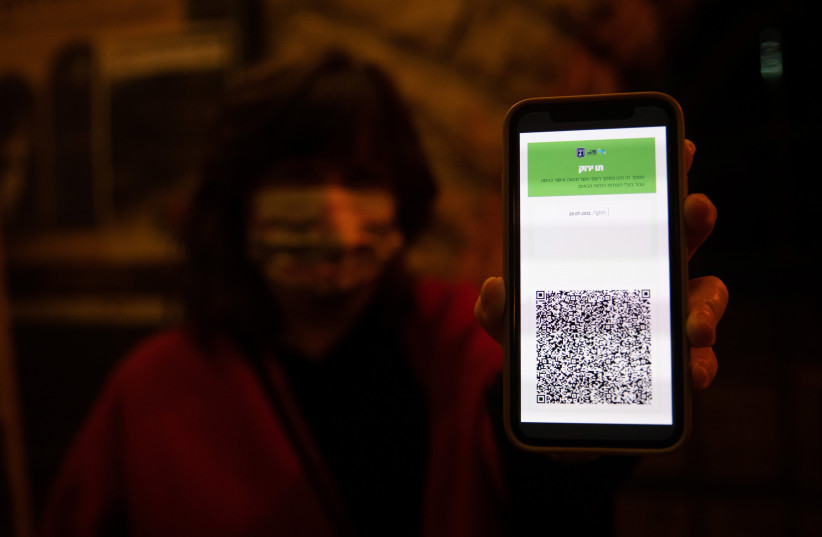Vaccinated tourists from the US will be allowed to enter Israel with their own health declaration despite not having an electronic Green Pass, Dr. Sharon Alroy-Preis, head of Public Health Services at the Health Ministry, said Tuesday.“They are going to get in with their own declaration of vaccination,” she said at the Jerusalem Post Conference in a conversation with senior health analyst Maayan Hoffman. “Once they get in, they have to submit their vaccination status and their certificates. A percentage of them will be inspected.”
The visitors will be exempt from isolation, provided that they meet the criteria of who is considered inoculated in Israel, Alroy-Preis said.
Watch the Jerusalem Post 10th Annual Conference video >>
“If they have a fresh vaccine booster, or less than six months have passed since their first vaccine [series of two shots], they will be allowed to receive a Green Pass in Israel to go around, and if not, they need to be in isolation for seven days and then take another PCR test,” she said.
Last week, Health Ministry Director-General Nachman Ash said the authorities intend to reopen the borders to foreign nationals who are fully vaccinated as early as November.
To prove their status, visitors would be required to present an electronic Green Pass, which is used in Israel and several other countries, including all European Union members, but not in the US. Last month, Jerusalem joined the EU’s digital COVID certificate program, ensuring mutual recognition of the documents.
Israel is once again close to reach herd immunity against the coronavirus, Alroy-Preis said.“When we looked at the third wave, we left it behind, although a third of our population, mostly children, were not vaccinated,” she said. “At the time, we did not know it. But in retrospect, our numbers were down because there were enough vaccinated people to get to herd immunity. This protected the children.”
After the Delta variant became dominant, the situation changed, Alroy-Preis said.
“The infectiousness of Delta is higher, and therefore, the level needed for herd immunity is higher,” she said. “We do not know what the exact number is, but I believe that what we are seeing now is that Israel is again getting to a place where enough people are vaccinated or recovered to reach herd immunity.”
During the fourth wave, which started around mid-June, more than half (55%) of the cases have been among children too young to be vaccinated, and there have been cases of serious post-COVID syndrome symptoms among the young.
This characteristic of the fourth wave has been the biggest challenge for the health authorities, Alroy-Preis said.“We want to have children back in school with in-person learning and back to their normal lives,” she said. “But at the same time, they are the ones who are not protected. Therefore, we need to be cautious and not rush to decisions about isolations without testing if this would increase infection among them.”
Alroy-Preis was apparently referring to the Green Class outline, under which children who are exposed to a verified patient are not required to quarantine, but rather to be tested every day and can continue to attend school if they are not infected.The outline was only supposed to be implemented next week, after the end of a pilot in a limited number of schools to check its safety. but Prime Minister Naftali Bennett pushed health officials for it to commence already on Sunday in cities with low morbidity rates to reduce the number of children and parents forced to stay at home.
“I hope that the things that are happening now in schools are not going to derail us [from the goal of herd immunity],” Alroy-Preis said. “I think that we are really getting to it.”
When asked about Bennett’s management of the coronavirus crisis compared with his predecessor, Benjamin Netanyahu, she said it was the responsibility of government representatives to make decisions that take into account the different elements of running a country and listening to the advice of health professionals.
However, Alroy-Preis rejected the idea that the fourth wave has been left behind without any major restrictions and any major shortcoming.
“Some 1,400 people died,” she said. “There is benefit in keeping the economy open, and there is some cost to it.”From a health perspective, it would be easier to just keep the skies closed, Alroy-Preis said. But it is important to learn how to live alongside COVID-19, and that includes taking some risks, she said.
Compared to what happened during the first waves of coronavirus, Israel now has some additional layers of protection in place, such as the PCR tests required of everyone before boarding a plane and after landing, she added.To prevent or manage a fifth wave, Alroy-Preis said it was very important to maintain the infrastructure built to fight COVID-19, including testing and epidemiological investigation capabilities.
“We have to be prepared,” she said. “What we saw between the third and the fourth wave is that the virus was expanding exponentially. But our responses were actually very slow, so we need to take this into consideration.”Contrary to what happens with other bodies within the government, for example, those related to security threats, the Health Ministry does not have tools to make fast decisions, Alroy-Preis said.
“I think another point we need to learn is to watch the borders,” she said. “We know that the borders are the place from which the next variant probably will come, so we need to control them better.
“Therefore, we cannot really afford losing the PCR before boarding a plane and after landing. At some point, we may need to ask for another PCR test three or four days after arrival. We also need better enforcement of isolation: The fourth wave spread mainly from children who came back from traveling and did not quarantine,” Alroy-Preis said.
Watch the Jerusalem Post 10th Annual Conference video >>

